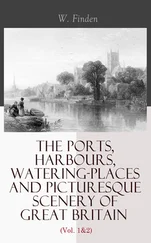'But after you have got an answer,' said Edlin, 'you must not repeat the question after the manner of a cross-examination.'
'I have been putting questions according to the rule of evidence,' said Clark, 'and if I do not get an answer, I must put the question again.'
'Then you have asked it again and again, and therefore your business is at an end.'
Clark addressed Emma. 'Have you heard the prisoner say anything with regard to her deceased brother?'
'This question has been put again and again,' said Edlin, 'and it has been answered in the negative, so there is an end of it.' Edlin was doing just what he accused Clark of doing: using repetition as a means of intimidation.
Ludlow took over from the clerk. 'We wish you to state what actually took place,' he told Emma, 'any conversation between you and the prisoner - not hearsay evidence. We do not wish to bring out anything not strictly legal and right. Perhaps you were never in a court of justice before, certainly never on so solemn an occasion; now I ask you if ever any conversation took place between you and the prisoner at the school with regard to her feelings towards the deceased.'
'I do not remember anything more.'
In his cross-examination, Edlin asked detailed questions about Whicher's visits to Warminster. 'He called once at our house,' said Emma, 'and another time at Mr Baily's, a private gentleman; he is a married gentleman. I know him; he lives exactly opposite. Mrs Baily, seeing me in my mother's garden, sent for me, and I went and saw Mr Whicher, I was not surprised at seeing him there because Mrs Baily had taken an interest in the matter, and asked me about it.' She testified that Whicher had shown her a breast flannel.
Edlin's line of questioning cast Whicher as sneaky and insinuating - to elicit evidence from Emma Moody, he implied, Whicher stalked her, sent a decoy from a house across the road to reel her in, showed her a piece of female underwear, coaxed her to work up her recollections into a damnation of her schoolfriend.
In the course of this, Whicher interrupted to address Emma directly: 'And I impressed upon you the importance of telling the truth and nothing but the truth.' He hoped, with this prompt, to encourage her to give the testimony he wanted.
Edlin tried to defuse the appeal. 'We take it for granted,' he said to Whicher.
'I would rather have it from the prisoner,' said Whicher. (Emma was not a prisoner but a witness - Whicher's slip reflected his frustration with the girl.)
Emma agreed that Whicher had admonished her to tell the truth.
Ludlow once more asked her if she recalled any other conversation with Constance about Saville. She said not.
'The question has been asked again and again,' said Edlin, again.
'Have you remonstrated with the prisoner respecting any conversation you have had with her?' asked Ludlow.
'Yes, sir,' said Emma, at last approaching the conversation she had reported to Whicher. But Edlin instantly objected. The Bench should not be putting such questions, he said; in the interests of humanity he appealed to them to let Emma go.
After a private consultation with Edlin, the magistrates agreed to dismiss Emma Moody.
Joshua Parsons gave his evidence about the post-mortem, which followed what he had reported at the inquest. 'I knew the poor little fellow that was killed, very well,' he added. The doctor testified that he had seen a very clean nightdress on Constance's bed on the morning of the murder. In reply to Edlin, he acknowledged that 'it might have been worn a week or nearly so', and that 'very great force' would have been needed to inflict the stab at Saville's heart. He was not asked for his views on whether Constance was a maniac.
When Henry Clark questioned Louisa Hatherill, Constance's other schoolfriend, she repeated what Constance had told her about the partiality shown to the new family and the slights to William.
Sarah Cox gave evidence about the missing nightdress: she described how Constance had visited the room in which she was packing the laundry on the Monday after the murder, and the furore in the house-hold when the nightdress was found to be missing. Yet Clark failed to bring out Whicher's theory about how Constance had stolen back an innocent nightdress in order to conceal the destruction of the guilty one.
Cox showed no hostility or suspicion towards Constance. 'I observed nothing unusual in the prisoner's manner or behaviour after the murder, except ordinary grief,' she testified. 'I have never seen or heard from her anything unkind or unsisterly in her conduct to the deceased.'
Mrs Holley was the last witness. She was questioned about the missing nightdress. In the five years that she had been washing the Kents' clothes, she said, only two things had gone missing before: 'one an old duster, the other an old towel'.
Edlin began his closing speech by asking the magistrates instantly to liberate Constance Kent. 'There is not one tittle of evidence against this young lady.' With extraordinary nerve, he equated the investigation of the crime with the crime itself: 'I say that an atrocious murder has been committed, but I am afraid that it has been followed by a judicial murder of a scarcely less atrocious character.'
'It will never, never be forgotten,' he continued, 'that this young lady has been dragged from her home and sent like a common felon - a common vagrant - to Devizes gaol. I say, therefore, that this step ought to have been taken only after the most mature consideration and after something like tangible evidence, and not upon the fact that a paltry bedgown was missing - as to which Inspector Whicher knew that it was in the house, and that Mr Foley examined it with the medical man the day after the murder, together with the young lady's drawers.' Edlin was drawing attention to the many men who had rummaged in Constance's underwear. Deliberately or not, he misunderstood Whicher's theory about how the nightgown's destruction had been disguised. If the nightgown was unstained, Edlin asked, what object could there be in removing it? He insisted that the fact of the missing nightgown 'had been cleared up to the satisfaction of everyone who had heard the evidence that day, and no doubt could remain that this little peg, upon which this fearful charge had been grounded, had fallen to the ground'.
'I say that to drag this young lady from her home in such a way and at such a time, when her heart was already harrowed by the death of her dear little brother, is quite sufficient to excite in her favour the sympathy of every man in the county, and not only that, but every man in this land of unbiased mind, who has heard - and there are few who have not heard - of this horrible murder.'
At this point both Samuel and Constance Kent succumbed to tears, and hid their faces in their hands. Edlin continued:
'The steps you have taken will be such as to ruin her for life - every hope is gone with regard to this young girl . . . And where is the evidence? The one fact - and I am ashamed in this land of liberty and justice to refer to it - is the suspicion of Mr Whicher, a man eager in the pursuit of the murderer, and anxious for the reward that has been offered . . . I do not mean to find fault with Mr Whicher unnecessarily; but I think in the present instance, his professional eagerness in the pursuit of the criminal has led him to take a most unprecedented course to prove a motive; and I cannot help alluding to the meanness - I say the indelible meanness, I may say the discredit, and I was about to say the disgrace, but I do not wish to say anything that shall leave an unfavourable impression hereafter; - but I will say the ineffable discredit with which he has hunted up two schoolfellows and brought them here to give the evidence we had heard. Let the responsibility and disgrace of such a proceeding rest upon those who have brought the witnesses here! . . . It seems to me that he has allowed himself to be strangely led away in this matter. He was baffled, and annoyed by not finding a clue, and he has caught at that which was no clue at all.'
Читать дальше












